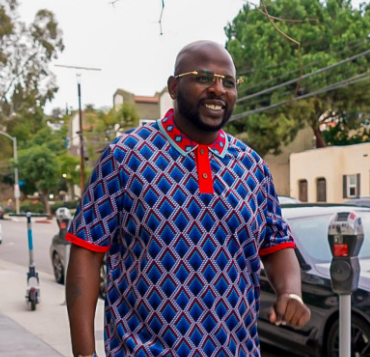-
play_arrow
On The Street On The Air | Kaya 959
Dr. T: A Guide to Sexual Health & Pleasure
By Litha Hermanus
Sex is both a want and a need. When you figure out which one it is for you, and when that is, you become a freer human being in life. Your world is suddenly filled with a transcendent peace. And don’t we all love world peace?
These are some of my offbeat musings as I sip on a Merlot in the wine cellar of the Local Grill, a restaurant in Parktown North. I am waiting for the flourishing and very busy Dr. Tlaleng Mofokeng. It’s a late lunch meeting. She’s coming from Bryanston – an interview about her book. I, too, am chatting to her about her debut title Dr. T: A Guide to Sexual Health & Pleasure. Never mind that she’s joining Uncaptured on Kaya 959 for an hour after we’re done.

She arrives at the restaurant and calls, not knowing I’m already here. In her state of business, she has missed the WhatsApp message that tells her this.
‘Should I get a table for us?’ she asks.
‘Nope; ask them to show you to where they keep the wine.’
I get up to go meet her halfway. We walk in. Her smile says she is happy to be here; she loves the setting. A long wooden table (perhaps for twelve) separates us; we sit at the center, under a light. Everywhere around us bottles keep quiet watch as if sentinels. We haven’t seen each other in a long time. And though we are celebrating her book to some degree, the meeting isn’t entirely a festive one. Still, when in a cellar do as the wine bottles do – get some wine in you. Dr. T orders a glass of Chardonnay and we talk candidly about her; the intentions behind her book; the result; as well as how she feels about the accomplishment.

Our lady is no stranger to accomplishments. She is a Medical Doctor (MBChB) with a degree from the University of Kwa Zulu-Natal. She’s been a resident voice on many radio stations, including Kaya 959, and besides being published in newspapers and magazines nationally and abroad, she has a television show of her own called Thrills on DSTV. As an activist and advocate for sexual and reproductive health rights she sits on the boards of the GABSHW and SWEAT: the Global Advisory Board on Sexual Health and Wellbeing and the Sex Worker Education and Advocacy Taskforce, respectively. She’s advised the Parliament of the Republic of South Africa on sexual health rights and reproductive justice. She’s spoken to audiences at the Bloomberg School of Public Health (Johns Hopkins University) in Baltimore, imparting knowledge on how to create and grow a strong digital brand in the field of public health. Her words have even echoed in the U.S. Senate in her push-back against the ‘global gag rule’ – negative policy against female bodies in relation to abortion and funding, a rule that results in adverse material impacts on the ground. Dr T is the recipient of awards and prizes too many to name. Yet writing a book is no mean feat! And writing a brilliant one is an even taller order. She has managed both. And when I ask her how that accomplishment feels, all she can do initially is let out a sigh; but it is soon followed by a triumphant smile.
Listen to her conversation with Kgomotso Matsunyane & Ndumiso Ngcobo on #KayaUncapured
What makes her book brilliant? There are different answers to this question for each of us, I presume, but these are some of mine.
Before she is a medic, Dr. T is a girl, a womxn, who grew up oppressed in a multiplicity of ways – certainly by the authorities as an African, but also as a womxn by the ideologies of white men and womxn, as well as those of African men. This is true of African womxn in general. But she, unlike many others, was also fortunate enough to have the ability to converse with her mother about being a girl and (later) a womxn in the world. Her mother laid bare certain realities other parents and caregivers tend to eschew bringing up with their kids. She did not simply communicate external aspirations to her daughter. She was vigilant in getting Tlaleng to know her own body along with knowing her environment. This kept Tlaleng ready, aware of what to expect when some of her bodily transformations came around.
If you read about Dr. T’s first experience with her menstrual cycle, as an example, it is vastly different from what I know many womxn in my life to have gone through. In her account, Dr. T notices the first sight of red and is so excited by it that she forgets to flush the loo after passing urine. She calls her mother, who is at the supermarket she owns, and they celebrate over the phone. ‘I’m a womxn!’ screams Tlaleng. Her mother reminds her where they keep the sanitary pads, but Tlaleng already remembers. She has been waiting for this day. I do not exaggerate when I say the amount of preparedness in this passage comes across as one that could rival that of a Japanese family for an earthquake.
Dr. T’s awareness and readiness are interesting to me because one of my aunts has an account that is quite different when it comes to the same female phenomenon. It was traumatic for her in a sense. She was a tomboy and was always climbing up trees with my father and other boys. But back in her day, this was discouraged and she got hiding each time she was caught doing it. Of course, she obeyed the grown-ups in their presence, but in their absence, she obeyed her instincts and went back up among the branches and leaves. The day her first flow came was after she had fallen from a tree. So she was scared to tell anyone about the bleeding because hiding would surely follow any care that would be afforded her. She figured she would wait out the crimson tide because the pain was not unbearable. But when a couple of days went by and things had not changed, she cried out for help. For me, there was something horrific in how she became aware of such an important and expected change in her life. It is comforting that Dr T speaks to us from a position of years of positive body affirmations and anatomical self-awareness that predates even her days as a medical scholar.

But thank all goodness she is a medic. A medical doctor writing about human anatomy and the physiology of sex is useful because there are many men and womxn who think their adventurous exploits in the bedroom, multiplied by their ‘body-counts’, make them authorities on all things sexual. Dr. T approaches the subjects of health, pleasure, and rights from the level of human experience, sure, but she marries that with academic knowledge. The book is not brilliant simply because she is a doctor and speaks from a position of personal experience. Many doctors have the ability to do this. But she does it in a way that bridges the gap between what is academic and what is popular, never leaving the reader lost and feeling as though she is luxuriating in her own knowledge. Many professionals tend to let a measure of self-importance creep in when they let us into their worlds. As we chat, Dr. T reveals that her ability to reach everyday people with otherwise complex knowledge is something that has been a key factor for her in interacting successfully with her patients.
As an activist, she highlights the constrictions imposed on the bodies and sexual freedoms of womxn. She shows how patriarchy (its values and skewed expectations around morality) dominates ideas of sex, consent, and sexual expression. She articulates her points with a sophistication and simplicity that come together effortlessly as if consenting partners in play.
While the work is ordered into three sections (namely Sexual Health; Sexual Pleasure; and Sexual Rights) it does not succumb to rigid linearity. It reads like a full text from start to finish should one wish to approach it this way and get a broad understanding of things as Dr. T intends to give. Yet it also reads like a document of reference one may use on an ad hoc or need-to-know basis, for knowledge on various aspects of sex, sexual pleasure, identity, expression, health, and rights.
Also Read: Celebrate the Johnny Clegg in YOU! Part two
For example, if a couple experiences the phenomenon of ‘air trapping’ (dealt with on p.63 under Medical Conditions) they may simply look up what that is about and learn it is caused by something called ‘tenting’ in a womxn or is encouraged by pressure built up through penetration and thrusting, either with a penis or another penis-like protuberance such as a sex toy. Moreover, the couple may learn that ‘air trapping’ happens to everyone, and all embarrassment or worry, if any threatened to stay, may dissolve. Similarly, individuals who read the book may do this with other medical conditions they encounter that threaten or impact their sexual health and lives.
In the Sexual Pleasure section (pp.167 – 216) one may learn about how to explore their own body with confidence and how to regard it always with affirming thoughts. If one wants to find out about the anal play, girl on girl pleasure, orgasms, the book is a place of the first contact in terms of exploring personal questions and ideas. This is true of the Sexual Rights section as well. It is in this part of the book that Dr. T’s chief triumph resides for me; it is here where her brilliance is highlighted most. The book becomes a set of eyes and ears into a new world for many of us. While the glossary is an apt example of the point I am making here, because it has the express function of elucidating the meaning of particular words and concepts, the entire book serves to break down meanings of new or rather previously unpopularised ideas around sexual health, pleasure, and rights. Identities such as those of the LGBTQIA+ community as well as the plight, fight, and rights of sex workers are explored in a way that demystifies them. The book is an invitation to interact with a new and more comprehensive understanding of sexuality and identity, with the self and with the world. But this is only for those who have the eyes with which to see, and the ears with which to listen to these ideas. I was telling Dr. T that the book has hit me most in this way and that all womxn need to buy it for the men in their lives who are not buying it for themselves. At hearing this she told me the text has indeed worked in ways she would never have envisioned when she wrote it. Four priests, for example, have secured multiple copies with the intention to incorporate Dr. T’s work into their marriage counseling. The book gives them a language and understanding of things that were, up until now, difficult for them to capture. It does the same for me.
If there is any criticism to be leveled against the book, however, it is that, to a minor extent, it reads like Google MD – a series of Web MD or Mayo Clinic entries online. This is not in terms of style but medical information, and only in the following (and very specific) way. It tells one what a problem may look like or be, and asks him or her to still visit a doctor to find out if there is a problem in the first place. This is something one is able to do easily without the book. One can go online to serve the same purpose. While this may sound like a downright criticism of the work, it is not. Firstly, it is always better to visit the doctor with some knowledge in your own head rather than without. If he or she refutes it, that is fine. But unlike a medical professional with an obscure identity on a random medical website, we know that Doctor Tlaleng Mofokeng walked through the same halls of knowledge as the likes of Steve Biko. Her alma mater is one that is reputable and at once recognisable to us.
Also Read: Unpacking ‘Colour me Melanin’ with Slam poet Belita Andre
The bottom line is she hasn’t invented or discovered anything new here. She has simply curated medical and other information that is already in the public domain in a way that is congruent with who she is and where she is in her own understanding. She only invites one to take part in the little she has decided to share out of what she knows. Yet she does this in a way no other human being can do, with a unique accessibility that invites the reader into her personal stories, whether they be about sanitary pads and tampons, and how she eventually opted for a menstrual cup; or they were about her travels in the world, which led (and continue to lead) her into more growth. By her own admission, she didn’t write this book because she had a personal urge to dispense knowledge in this way. She was going about the business of her then a day when she realised that, everywhere she spoke, people were asking her for a book. They were not asking her to lead them to where they could find certain information. They appreciated her saying it, because something in them resonated with how this distinct, emergent voice in our society was articulating things both personal and political.
In my own work as a writer, I am passionate about our children, and particularly our boys having the opportunity to avoid the toxic ways in which we were socialised. This book is one that will live in my home for a long time to come. It will assist me and mine in navigating sexuality, that part of identity, health, and human rights that is often treated as taboo, and dealt with dubiously under the oppressive grips of patriarchy and heteronormativity. Dr. T: A Guide to Sexual Health & Pleasure … Don’t sleep! Get you a copy.
Litha Hermanus is the author of new Penguin release: The Eyes of the Naked – a political and psychological novel. He is a freelance writer and businessman with an MA degree in Creative Writing and an Honours in Media Studies, both from Wits University.
Written by: Zuko
Similar posts
-
MORE ARTICLES

MaBlerh announced as host of The Real Housewives of Durban reunion

Discussion: How safe is it to go out at night?

The Business of restauranteering with Alessandro Khonjane

WATCH: The Business Of – A conversation with Gemelli’s Alex Khojane on food and dining

Carol Bouwer and her husband celebrate 24th wedding anniversary
-
QUICK LINKS
UpComing Shows

959 Music Weekdays
Kaya 959 Hits
Real. Familiar. Memorable. Kaya 959 brings you the music you know and love from our playlist. Uninterrupted. Thursdays 20h00 to 21h00
close
The Best T in the City
With T Bose
He has held it down in the world of mid-morning radio with the best music, riveting topics, brilliant mixes and interesting guests. Every weekday, The Best T proves why he is the BEST by connecting to you like only your bro or favourite uncle could. He lets his listeners dictate the songs they want to hear in the ever-popular Top 10 at 10, and his Three Teaspoons never run out. Catch The Best T in the City Mondays to Fridays from 09h00 to 12h00.
close
Feel Good
With Andy Maqondwana
Feel good about feeling good! That's exactly what The Feel-Good show is about. An escape from the negativity that surrounds us, indulging you in good feels. Pass it on to one and all. Spread the good feeling around Gauteng with Andy Maqondwana.
close
The Hive
With Bonolo "Bee Sting" Molosiwa
Every "Hive" needs a Queen B and Bonolo "Bee Sting" Molosiwa is Kaya 959's honey who brings in the money. With her bubbly personality, infectious laugh, Bee Sting radiates positive energy which is all you need to get your weekend off to the best start. Don't miss the Afrobeat Dancehall Ragga (ADR) Top 10 on The Hive with Bee Sting every Saturday from 18h00 - 21h00.
closeConnect with Kaya 959
DownLoad Our Mobile App
© 2024 Kaya 959 | On The Street On The Air











